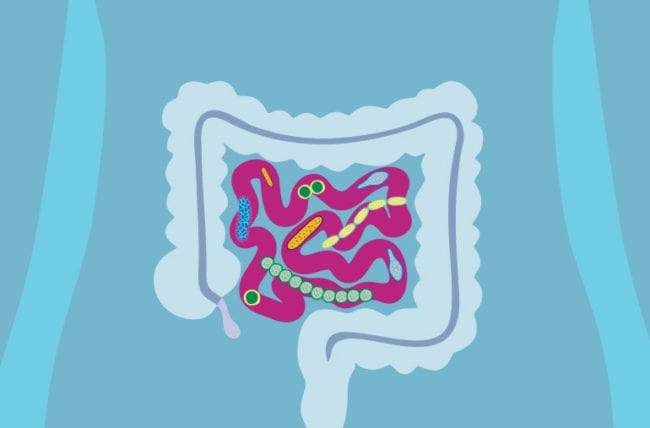
SIBO, or small intestinal bacterial overgrowth, happens when the bacteria that normally grows in the large intestine is present in the small intestine. This overgrowth in the small intestine causes pain and diarrhea, and can also lead to malnutrition as the bacteria feeds on the body’s nutrients. To successfully recover, it’s important to focus on the cause of SIBO. However, SIBO is not very well understood at this point.
Common Causes of SIBO
1. Low stomach acid:
With less than normal amounts of stomach acid, undigested food, especially undigested carbohydrates, are able to enter the small intestine.
Bacteria feed on these carbohydrates, which causes them to increase in numbers. The bacteria produce hydrogen and methane gas, which increases pressure in the abdomen. This pressure pushes acid from the stomach into the esophagus (causing acid reflux).
Low stomach acid prevents bacteria that enter the stomach from being killed, which increases the vulnerability of the gastrointestinal tract to bacterial, fungal and parasitic infections.
Other factors that can cause low stomach acid are anti-acid meds, stress, nutritional deficiencies, alcohol consumption and infections such as parasites.
2. Decreased mobility:
Those with decreased mobility often suffer with constipation – where digested food moves more slowly through the small and large intestines. This also encourages the growth of bacteria in the small intestine.
3. Stress:
Stress impacts many parts of digestion. When under stress, our bodies produce less stomach acid, which can lead to less bile being secreted and less digestive enzymes produced – both of which can contribute to SIBO.
Stress weakens the immune system by making us more susceptible to bacterial infections and the need for antibiotics, and further increases the risk of developing SIBO.
Stress also reduces motility. As the movement of food and bacteria slow down through the intestines, bacteria multiply and become more populated, which increases the risk of SIBO.
Symptoms of SIBO
Symptoms of SIBO include abdominal pain, cramps, bloating, indigestion, diarrhea, gas, weight loss, inability to absorb nutrients from diet (like vitamin B12) and a low red blood cell count.
SIBO is often associated with Celiac disease, Crohn’s disease, irritable bowel syndrome, diabetes, Parkinson’s, leukaemia, Scleroderma, alcoholism, lymphoma, low stomach acid and many others.
Diagnosis
A SIBO diagnosis is based on symptoms and medical history, as well as a blood and breath test. Doctors can also test for anemia, electrolytes, vitamin deficiencies and more.
Treatment
Common treatments for SIBO include antibiotics or antimicrobial herbs. Standard of care aims to manage the symptoms of SIBO rather than treating the cause, therefore relapses are quite common.
My Take
Could the missing link in understanding SIBO be a parasitic infestation? Here are six ways that parasites could cause and promote SIBO:
- Parasites slow intestinal motility – most often causing constipation but some cause diarrhea depending on the type of parasite.
- Parasitic infections can cause low stomach acid by causing an up-regulation of the H1 receptors (inflammatory) and a down-regulation of H2 receptors (immune modulatory and production of stomach acid).
- Parasites cause IBS and IBD, which are both common with SIBO.
- Parasites, especially intestinal worms, can cause the ileocecal valve to be compromised (even opened) allowing microbes from the large intestine to enter the small intestine (see the first resource below).
- Parasitic worms have their own microbiota. As they deposit their waste in us, they also infect us with the microbes that live in them. Parasitic worms can live in the small and large intestines.
- Parasites produce many chemicals, some of which can impact our adrenals and cause us to suffer with depression and anxiety. This decreases our ability to handle normal stress, which will impact stomach acid production and immune function.
When our students in the Live Disease Free Academy successfully treat parasitic infestations and other infections, they enjoy long-term recovery from SIBO and chronic disease.
To learn more about SIBO and the best ways to truly recover, please watch my video below:
- https://www.medicinenet.com/small_intestinal_bacterial_overgrowth_sibo/article.htm#small_intestinal_bacterial_overgrowth_sibo_definition_and_facts
- https://www.healthline.com/health/sibo#symptoms
Image Credit: Cleveland Clinic
Blog Featured Image credit: ©Aflo Images via Canva.com

Clinically diagnosed with multiple sclerosis at the age of 28, Pam chose an alternative approach to recovery. Now decades later and still symptom free, she coaches others on how to treat the root cause of chronic disease, using a holistic approach. She can teach you how, too.
Pam is the author of Become a Wellness Champion and founder of Live Disease Free. She is a wellness expert, coach and speaker.
The Live Disease Free Academy has helped hundreds of Wellness Champions in over 15 countries take charge of their health and experience profound improvements in their life.

